Wix vs WordPress: Which one is best?
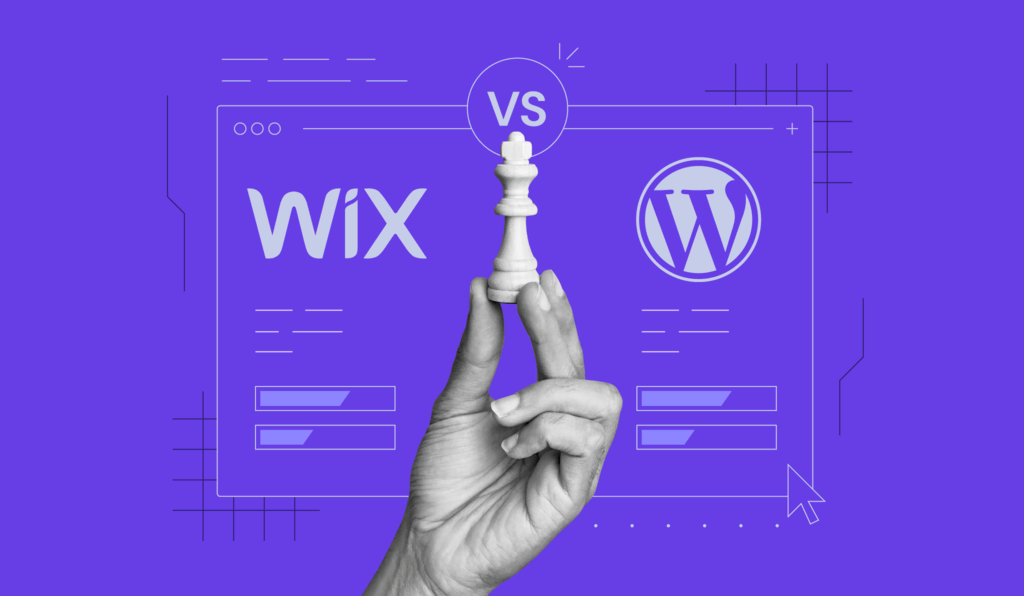
When it comes to website development tools, Wix and WordPress are both top choices for numerous reasons.
You might have heard Wix is easy to use for beginners without coding experience and boasts a large selection of pre-built templates. Meanwhile, WordPress is powerful enough for anything from personal portfolios to eCommerce.
This is true, but you need more context to decide which platform is best for you.
I have over 6 years of experience testing web development tools, and I’ll use what I know to get the most accurate results. Keep reading and find out where Wix and WordPress shine and fall short.
Wix vs WordPress overview
Let’s start with a quick recap of the key differences between Wix and WordPress:
| Wix | WordPress | Winner | |
| Ease of use | Drag-and-drop editor with a beginner-friendly interface, includes web hosting and a free one-year domain name | Extensive setup process, has a more complex dashboard | Wix |
| Pricing | Free plan is available, with premium options starting at $17/month | Free core software, only requires web hosting and a domain name to run (Hostinger’s Managed WordPress hosting starts at $2.99/month) | WordPress |
| Templates | 800+ pre-built templates and WIX ADI (built-in AI-powered website builder) for code-free customization | 13,000+ free themes and tons of premium options on third-party marketplaces | WordPress |
| Customization and extensions | 800+ free and paid extensions on the platform’s app market | 59,000+ free plugins on the platform’s official directory, offers full access to the site’s code for advanced customization | WordPress |
| Security | Built-in updates and other security measures | Depends on web hosting and security plugins ‒ needs maintenance but is scalable | Draw |
| Search engine optimization (SEO) | SEO setup checklist via Wix SEO Wiz tool | Advanced SEO tools via plugins, complete control over the site’s structure | WordPress |
| Customer support | 24/7 live chat support, phone support, AI chatbot, Wix Help Center | Customer support from the hosting provider, online resources, official documentation | Wix |
| Blogging | Advanced features rely on extensions | Built-in advanced features with tons of plugins to customize or expand them | WordPress |
| ecommerce | Basic ecommerce at $29/month | Free WooCommerce plugin for ecommerce functionality (Hostinger’s Managed WooCommerce hosting starts at $3.99/month) | WordPress |
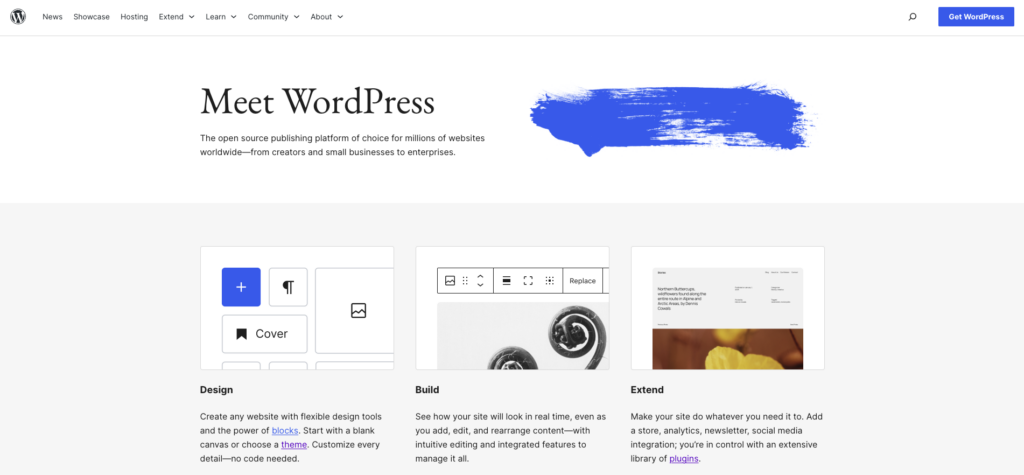
WordPress.org, commonly known as WordPress, is one of the best CMS platforms today. It’s versatile enough to handle all kinds of online content, so much so that big names like TIME and Rolling Stone use it.
Not to be confused with WordPress.com, this self-hosted solution lets you scale hosting resources like server capabilities and storage as needed. Once your WordPress website outgrows the current hosting plan, you can upgrade or switch to a different web host.
WordPress is also open-source, meaning you can create, edit, and share it under the GNU General Public License. Being able to access your website’s backend opens up tons of customization options, especially if you know how to code.
I recommend reading our dedicated article about WordPress if you want to learn more about the CMS. Overall, I recommend using WordPress if you:
- have coding experience or have built a website before.
- want to build a website with specific features or designs.
- want flexible web development costs.
- plan to handle large data or complex functions.
I tested the tool with Hostinger’s Managed WordPress hosting, so features and interface might vary with other web hosts.
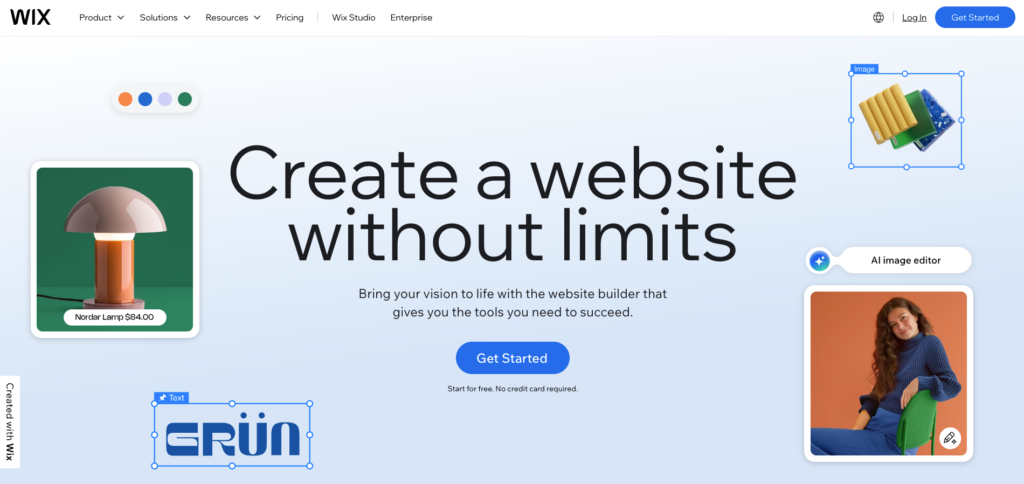
The biggest difference between WordPress vs website builders like Wix is the latter provides everything you need to create a website in one place. This includes web hosting and a domain name.
Each plan allocates specific server resources, features, and designs. The plan-based system makes scaling a Wix site easy, especially if you don’t know how to choose a web hosting plan.
Wix also takes care of maintenance and security for your website ‒ another reason why it’s popular for beginners.
To summarize, Wix is an ideal option if you:
- want to launch a simple website quickly or without coding.
- don’t have experience building a website.
- want fixed web development costs.
- don’t want the hassle of maintenance tasks like backing up your website or updating it.
Now that you know the differences between WordPress and Wix, let’s look at their features to help you decide which is best for you.
Wix vs WordPress: Ease of use
Building a website yourself is a cost-effective way to create an online presence. To get the most out of it, you need a platform that’s easy to use, especially if you’re new to website building.
Here, I’ll explore each platform’s setup process and their editing tools.
WordPress
Launching a WordPress website involves installing the CMS on a hosting server and connecting it to a domain. While this process seems complex, the system lets you configure the setup, which is great for building custom websites.
The key to making the entire process easy is choosing the right hosting provider.
Hostinger’s Managed WordPress hosting, for example, offers an easy onboarding process with the option to use an AI website builder. You can install WordPress, set up an account, and create a website in mere minutes.
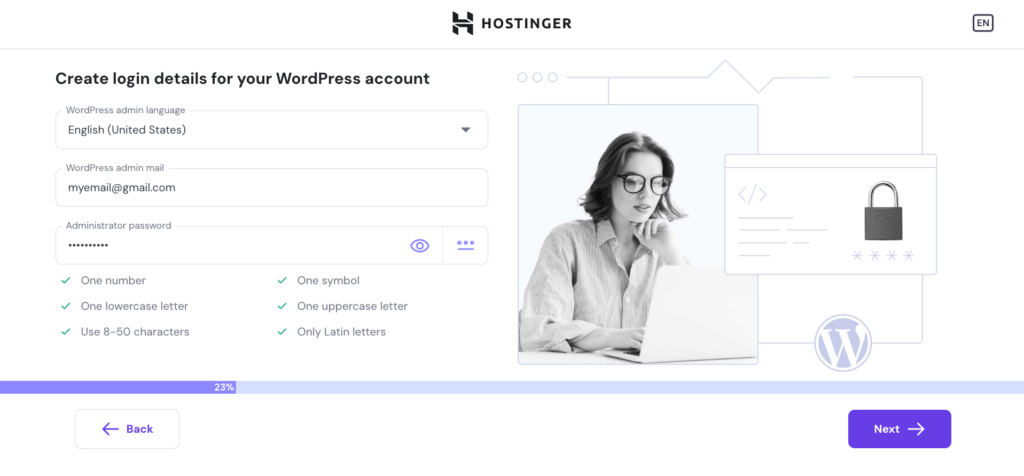
To get you started quickly, Hostinger gives the option to build the website using its AI website builder or pre-built websites and themes.
When I don’t have a theme in mind, I let the AI website builder create the base structure and tweak it later. Be clear when describing your ideas so the tool can produce better results.
Here’s a simple website I built using Hostinger’s AI Website Builder for WordPress without making any changes on my end. To save time, I asked for pages to promote services, show team members, and start a blog.

Hostinger also provides AI tools to create content and troubleshoot common problems. They are all designed to help you use WordPress to the fullest, even if you have no previous experience whatsoever.
And here’s what a WordPress admin dashboard looks like. More features will appear on the sidebar as you install WordPress plugins. I’ll explain this further in the customization and extensions section.
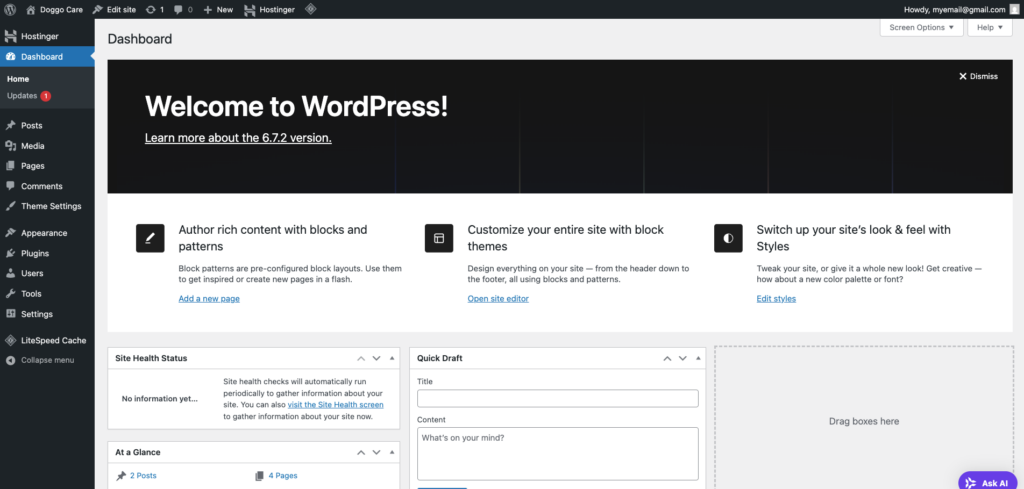
Hostinger users can use the pre-installed Hostinger plugin to complete website configuration. It also suggests useful tutorials to help you navigate the platform.
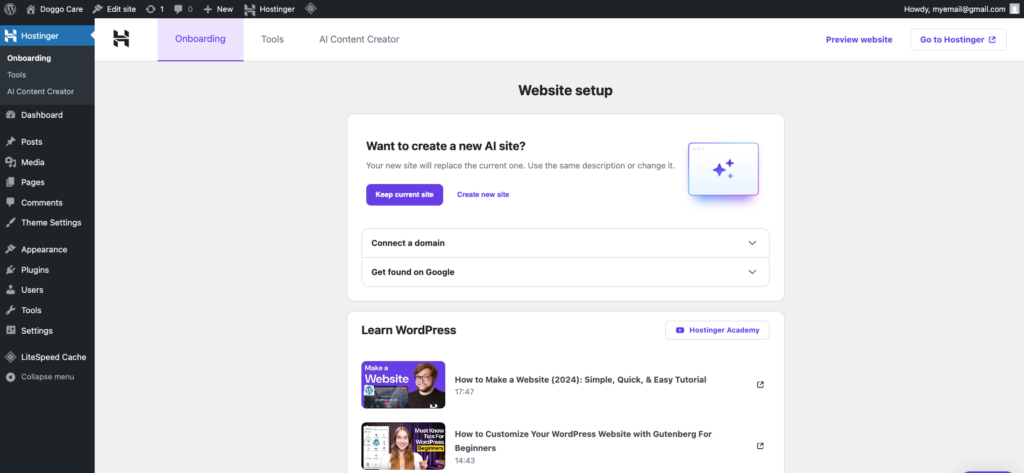
Wix
As a hosted solution, Wix offers everything you need to launch a website through its platform. Website building starts right after signing up for an account or buying a plan.
Like many website builders, Wix uses AI to make web development easier. The tool asks a series of questions to understand exactly the type of website you want to create.
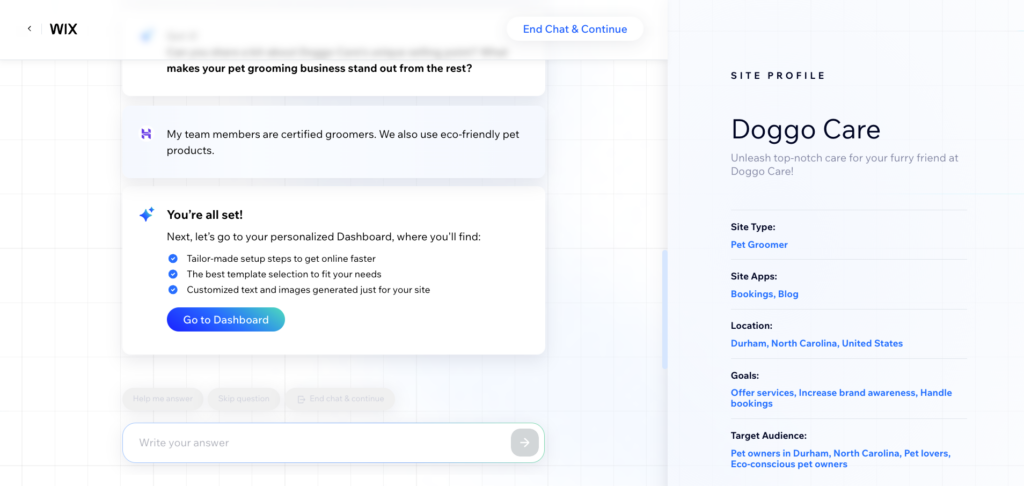
It then redirects you to the dashboard to finish the setup process. From there, you can either use the checklist to configure features or start with the design.
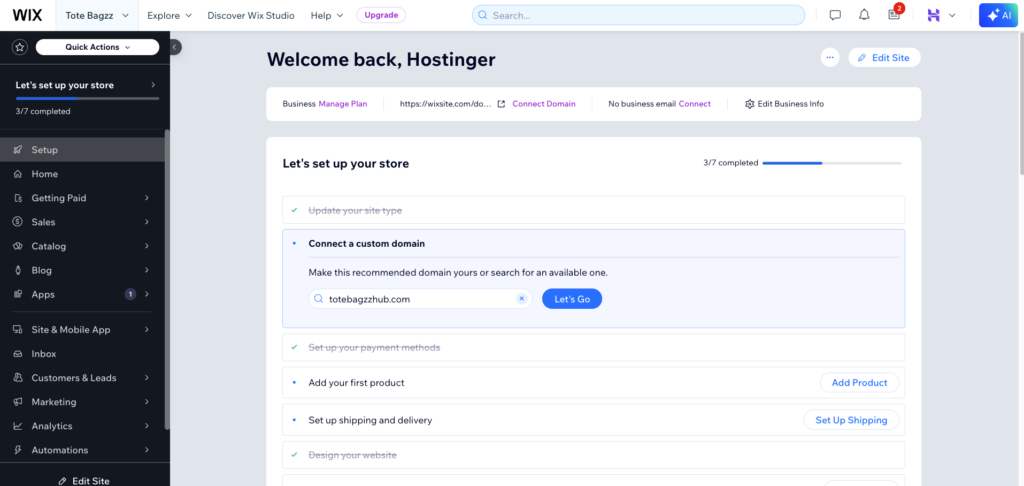
Unlike WordPress, Wix doesn’t launch your site automatically after onboarding. To do so, you need to access the website editor and click Publish in the top right.
I’ll cover the site design process in the template section. For the setup, that’s all you need to do to get started with Wix.
Verdict
WordPress is easy to set up with Hostinger’s AI website builder and tools. Wix, however, can be just as straightforward without relying on external services.
Being able to pick your own hosting is great for scalability, but not for ease of use. Therefore, Wix wins this round.
Wix vs WordPress: Pricing
Your website is an investment, so make sure you get the best value for your money. Let’s compare the pricing structures of WordPress and Wix to determine which is worth investing in.
WordPress
The WordPress core software is free to download, so you only need to buy a hosting plan and a domain name. Many hosting companies combine both in one plan at varying prices.
At Hostinger, managed hosting plans for WordPress range between $2.99–$15.99/month. All plans include a 30-day money-back guarantee, while annual plans come with a free one-year domain.

If you go with a different registrar, a custom domain usually costs $10-20/year. For context, Hostinger offers .com domains starting at just $4.99 for the first year, with even lower prices for generic domain extensions like .shop and .online.
Domain Name Checker
Instantly check domain name availability.
Building a specific type of website, like a blog or an online store, can cost an additional $2-1,000/year for premium plugins. The good news? WordPress offers plenty of free and freemium plugins, allowing you to start small and scale as your needs grow.
The same goes for WordPress themes. Premium options usually range from $2-200/year, with lifetime licenses costing around $1,000 or more for custom designs. However, the official directory also offers many excellent free themes worth exploring.
My colleague breaks down the cost of a WordPress website in a separate article. I recommend checking it out to see additional costs, like maintenance and security, as your site grows.
Wix
At Wix, you can sign up for a free account and start building a website. But there’s a catch ‒ it only includes limited features and requires you to use a wixsite.com subdomain.
What’s more, free websites must display Wix ads, which can hurt your brand’s credibility and user experience. For this reason, I suggest using the free plan to test out the platform and see how it works.
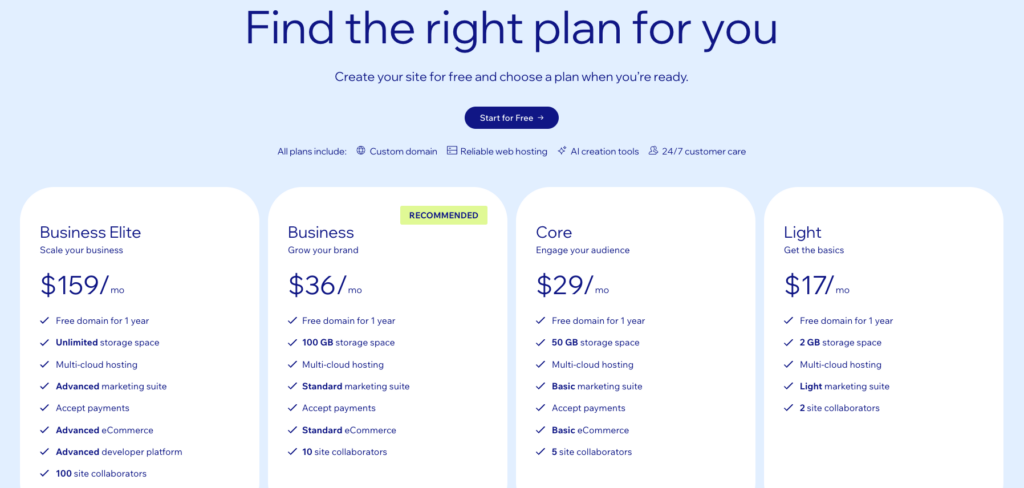
Wix has four paid plans. Each plan comes with a different number of collaborators, storage space, marketing tools, and ecommerce functionalities. All plans include a free one-year domain registration and a 14-day money-back guarantee.
The lowest-tier plan starts at $17/month, which is the minimum required to remove Wix ads. However, with just 2GB of storage space and basic marketing tools, it’s only suitable for small, non-commercial projects.
If you want to sell products, the Core plan at $29/month is the way to go. It comes with basic ecommerce features like customer accounts, store integration with social channels, and gift card functionality.
Wix recommends the $36/month Business plan as its best value for money. It supports six currencies, includes advanced features like referral programs and loyalty tiers, and offers up to 100GB of storage. This plan is geared towards medium to large online stores.
All templates are free, so you only need to budget for apps. Both free and paid versions are available. Paid apps usually range between $1.99-250/month, with many offering free or trial plans.
Verdict
If you’re budget-conscious, WordPress is a clear winner. Wix’s free plan might seem like a steal, but WordPress lets you kick off a project for just the price of a coffee.
When you’re ready to scale, you’ll have access to various premium plugins and themes to fit your budget. WordPress even lets you switch hosting providers to handle growing traffic and content volume, making it the winner.
Wix vs WordPress: Templates
Your website’s look and feel helps shape visitors’ first impressions, so creating appealing page layouts is crucial. With templates, you can easily achieve this without starting from scratch.
Let’s take a look at how WordPress and Wix compare when it comes to web design, from template options to how easy they are to customize.
WordPress
Changing the look of your WordPress website is easy with themes. A WordPress theme controls everything from design elements and page layouts to fonts and color schemes.
WordPress offers over 13,000 free themes in its official directory, with more added every year. Installing a theme is simple and can be done directly from the dashboard.
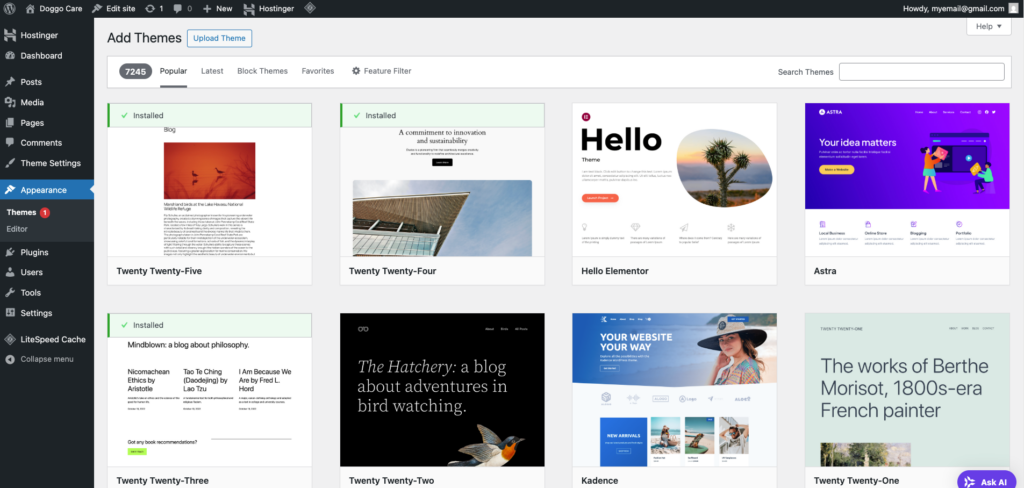
If that’s not enough, there are tons more options, including premium themes, on marketplaces like ThemeForest and Envato.
The downside of being spoiled for choice is that each theme has different specifications and support from third-party developers. For easier troubleshooting, choose a theme with regular updates and active support.
Since you’re responsible for maintaining your website, always keep your theme updated to ensure its security. At Hostinger, you can enable WordPress automatic updates so you don’t forget.
As for customization, you can modify your theme with the built-in Theme Editor. It uses block-based editing with pre-made patterns and templates for various pages, including front page and order confirmation.
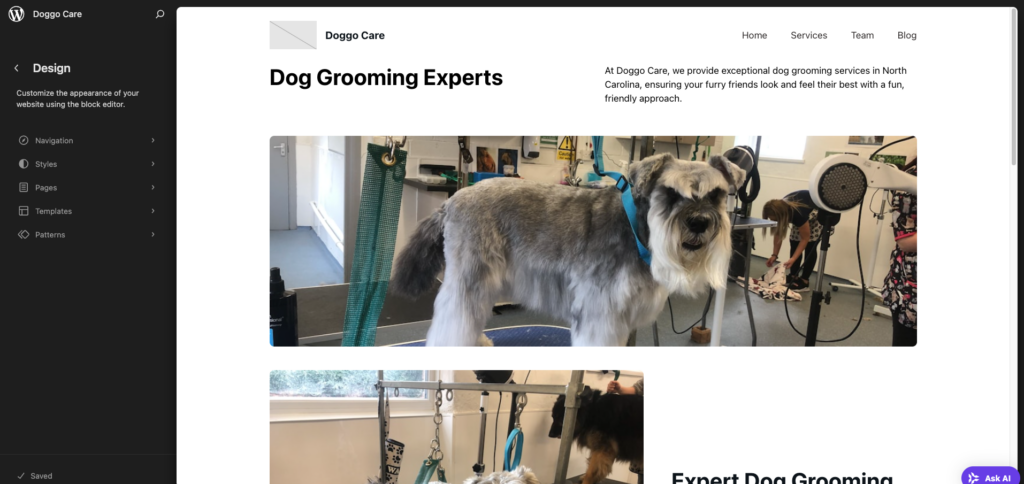
For advanced customization, I recommend installing a page builder plugin. Most come with drag-and-drop functionality and even custom blocks for niche elements like contact forms and Google Maps.
Wix
If you choose to design your website using AI, the tool will build on your initial setup responses. During this stage, you can tweak the site brief and generate multiple base designs.
This is a neat feature, as it lets you compare different versions and roll back if you like the previous design.
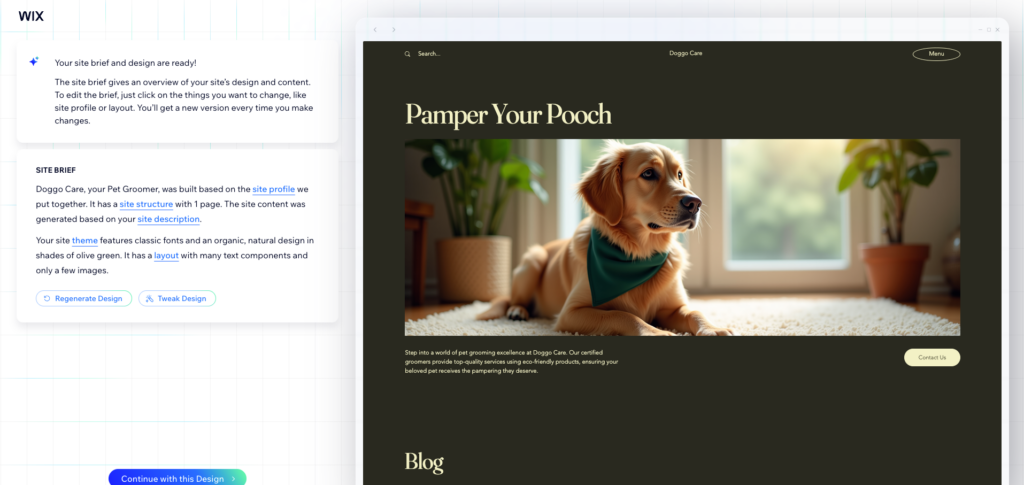
Alternatively, you can use a pre-built template as the base design. Wix narrows down options based on your website type or niche, but you can filter the results with other parameters.
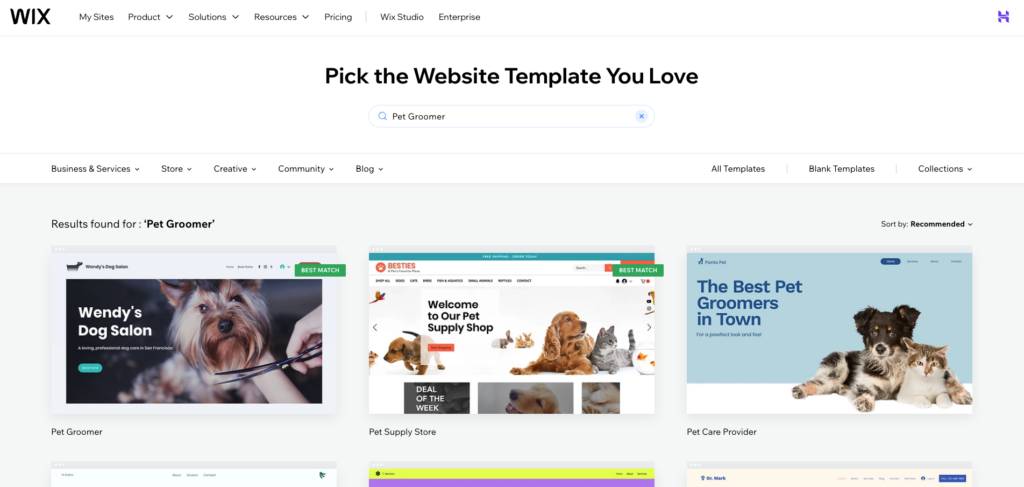
Wix Editor has built-in drag-and-drop functionality, making it easy to use. The grid system snaps elements into place, keeping them aligned no matter where you place them.
The editor is rich with features, giving you many options to make a unique design in one place. Some of the standout ones include animations, video maker, and AI-powered text and image generators.
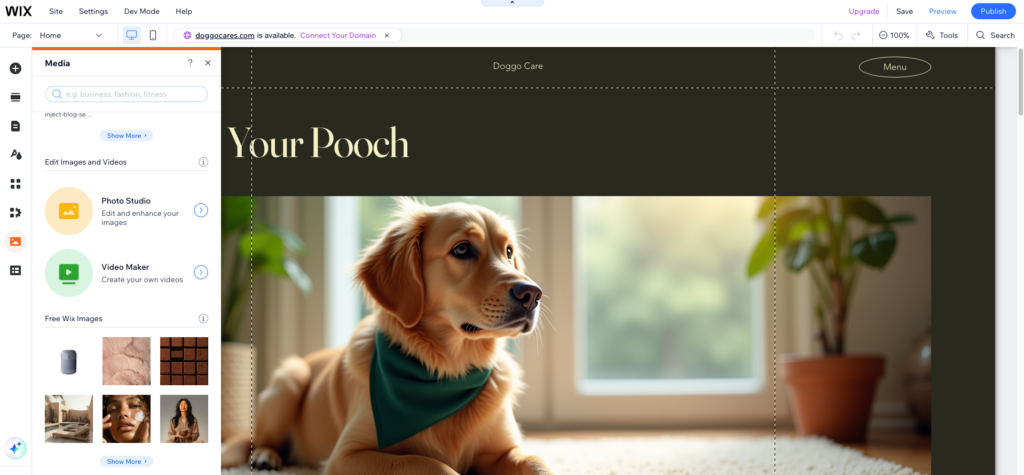
Unfortunately, you can’t switch to a different design once your website is live. The only way to change your site’s look is to build a new one and import elements from your old site.
Verdict
If we’re just talking about quantity, neither platform lacks options, no matter your website niche or type.
Wix has a slight advantage thanks to its drag-and-drop editor. However, not being able to switch to a different template after launch is a huge drawback. That’s why this round goes to WordPress.
Wix vs WordPress: Customization and extensions
Your website should have the right look and functionality to attract visitors and meet its goals. Let’s explore how versatile each platform is in helping boost your website’s potential.
WordPress
WordPress’ interface might seem more complex than Wix at first glance, but that’s because it offers far more customization options through plugins.
A WordPress plugin adds or extends your website’s features. Install plugins from the official directory and configure settings directly in the admin dashboard. The process is slightly different with marketplace plugins, but no coding is needed.
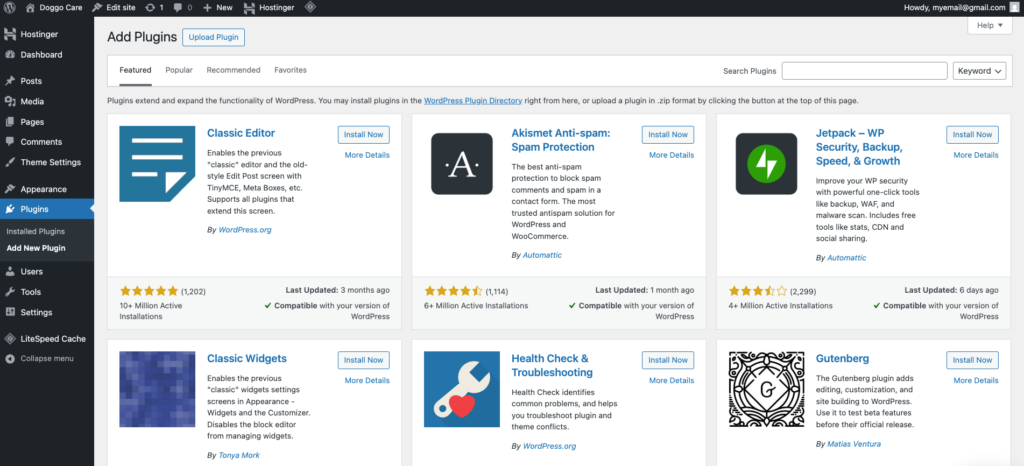
With over 59,000 plugins, you’ll find options for tackling various tasks ‒ creating galleries, adding custom contact forms, personalizing login pages, and more.
Like themes, plugins also come in premium versions. Upgrade to access advanced features when you outgrow the free version.
Can’t find what you’re looking for in the theme directory? Download a third-party plugin from a trusted source and upload it as a ZIP file.
Keep in mind that installing too many plugins can slow down your website. Instead, choose multi-purpose plugins that simplify your tools. Check out our list of must-have free WordPress plugins to start.
Installing a plugin is a straightforward process. Simply head to Plugins and pick from the directory or upload one. Managing plugins is easy with bulk actions, letting you activate, update, or remove them all at once.
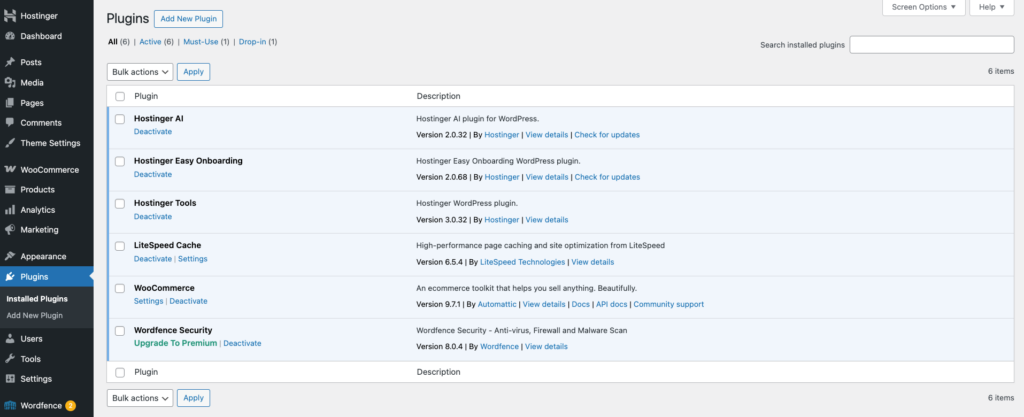
Wix
The Wix App Market currently hosts over 800 apps that tackle key design and business needs, ranging from marketing to traffic analysis.
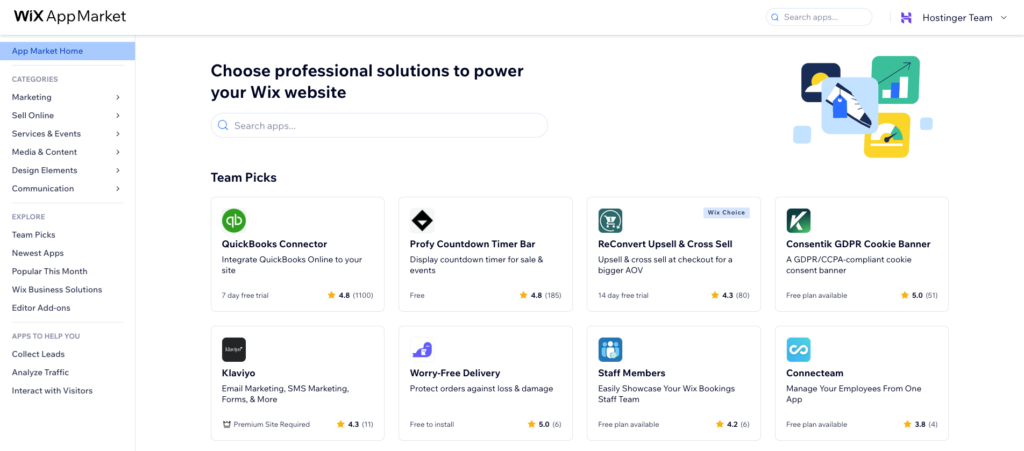
Each app comes with its own pricing model ‒ some even require a Wix paid plan and charge based on usage as you grow. Filtering apps by pricing would be helpful, but for now, we’ll have to rely on keywords and functionality to find the right fit.
You can install apps from the dashboard or Wix Editor. Choose an app, click Add to Site, complete the purchase if needed, agree to the terms, and you’re done.
Keep in mind that Wix only allows integration with third-party services through its official marketplace. If your site needs specific tools, check whether Wix has their app versions first.
Verdict
Both platforms can help you create a variety of websites, but WordPress stands out for its extensive plugin selection. Being able to install third-party plugins is especially crucial for businesses and professionals with unique needs.
Wix vs WordPress: Security
Choosing a secure platform helps keep your data safe and deliver a positive user experience ‒ both important for building brand credibility.
Here’s how WordPress and Wix compare and what it takes to keep your website safe on both.
WordPress
As an open-source platform, WordPress benefits from a large community of developers constantly working to improve security measures. It regularly releases security patches to address vulnerabilities in its core software.
However, as a self-hosted CMS, it’s up to you to implement these updates. The same goes for themes and plugins, as outdated versions can make your site vulnerable.
Hostinger users can enable WordPress automatic updates to keep their site running on the latest version. Alternatively, automate this task with a plugin so you don’t forget.
Your hosting provider also plays a significant role in keeping your website safe. Hostinger, for example, includes an automatic malware scanner, enhanced DDoS protection, and a web application firewall in all Managed WordPress hosting plans.
Plenty of WordPress security plugins offer extra protection against malware, automating tasks like security testing and scanning. My go-to plugin is Wordfence for its ease of use and ability to improve login security and block IP addresses manually.
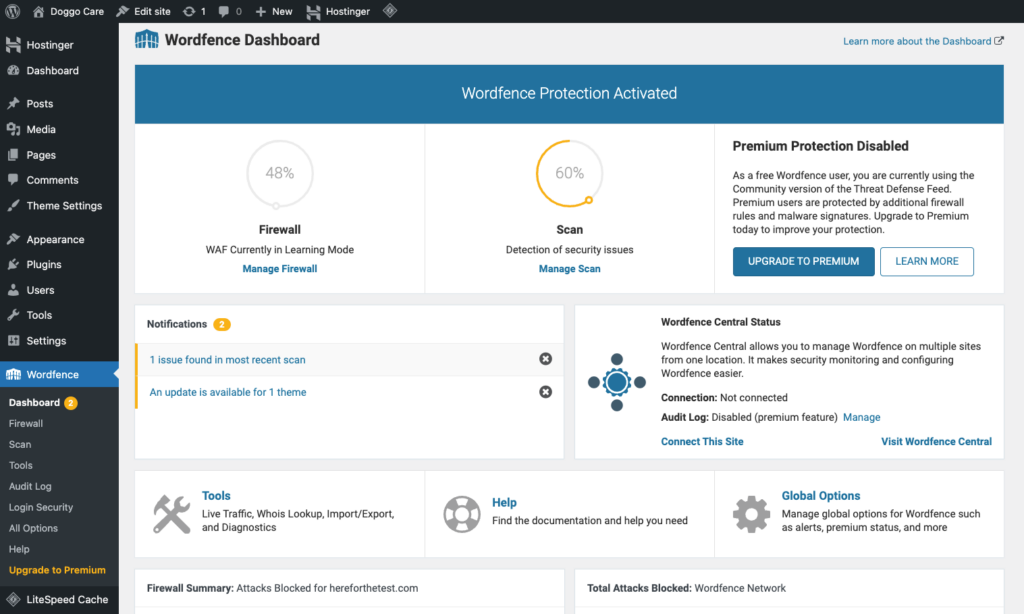
This isn’t to say WordPress lacks security. In fact, its hands-on approach lets you enhance WordPress security in many ways. The downside is that most methods have a learning curve or require technical knowledge.
Wix
Wix is a hosted solution, so you don’t need to install additional security software.
Every Wix website comes with built-in security features, including DDoS protection, data encryption, and 24/7 monitoring. Plus, all updates are handled automatically, guaranteeing your site stays secure without extra effort.
The platform is PCI DSS-certified, meaning it meets the highest security standards for protecting credit card data. If you plan to handle transactions through your website, this is a crucial feature to have.
To improve website security, Wix users can enable two-step verification and single sign-on with Facebook and Google accounts.
Verdict
I’m calling this one a draw because each platform caters to different use cases.
WordPress’ hands-on approach is ideal for those looking to customize or scale their site’s security. This lets you customize settings to fit your website’s needs, perfect for sites that can’t afford downtime or manage sensitive data.
On the other hand, Wix offers peace of mind by having security measures built into your website from the start. By letting the platform handle your site security, you can focus on creating content and growing your brand ‒ perfect for non-technical users.
Wix vs WordPress: SEO
Quality content and design are essential for keeping visitors engaged, but it’s the SEO capabilities of your chosen platform that drive traffic to your site in the first place.
Let’s see how SEO-friendly each platform is and what tools they offer to boost your search rankings.
WordPress
WordPress comes with built-in tools to simplify your SEO efforts. You can create custom URLs, edit meta titles and descriptions, add image alt text, and adjust other elements to improve site visibility for visitors and search engines.
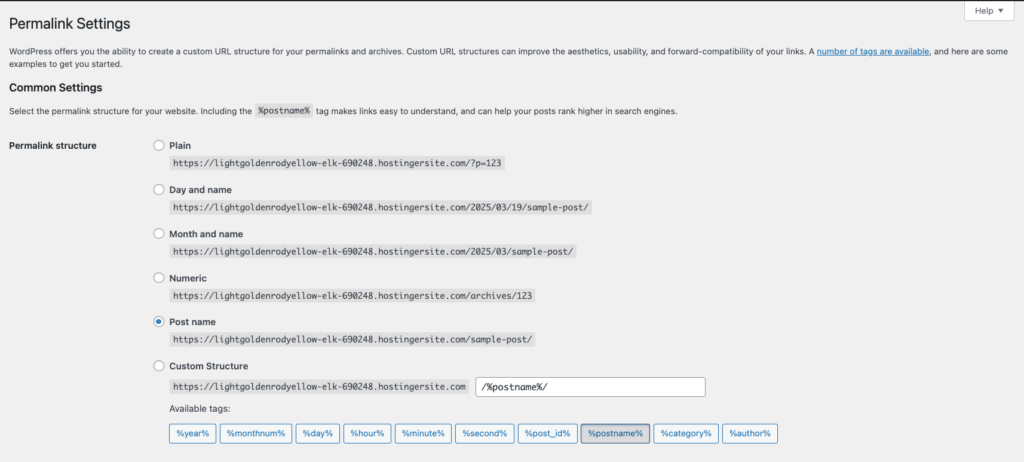
Most WordPress themes are designed with SEO in mind ‒ mobile-responsive and lightweight with built-in schema markup. Not only do they look appealing, but they also make your content easier to navigate and keep visitors engaged.
Check out some of the best SEO WordPress themes my colleague tested and compiled.
If that’s not enough, you have a long list of excellent SEO plugins offering advanced features.
For example, Yoast SEO excels in content analysis for on-page optimization. If you run an online store, All In One SEO integrates with WooCommerce to help you optimize product pages and categories. I’ll cover WooCommerce in the ecommerce section.
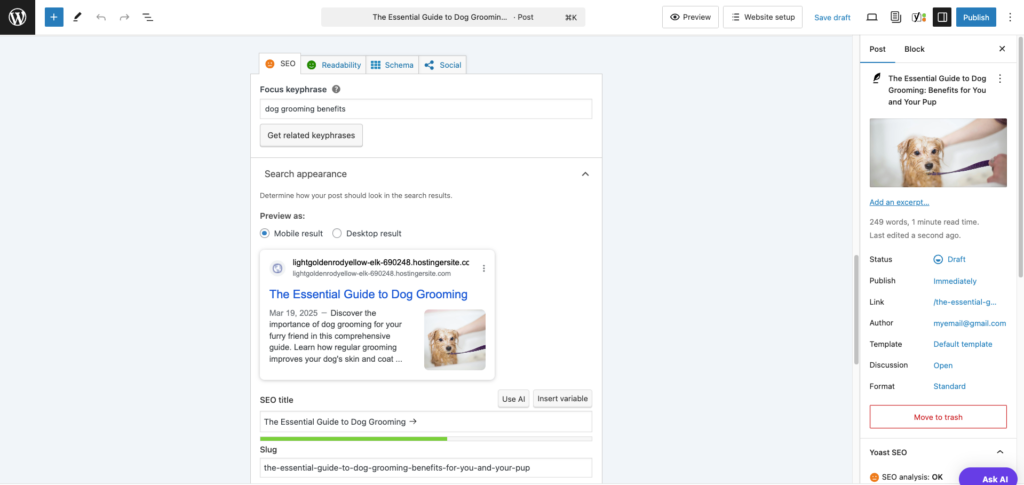
If you host your website on Hostinger, you get an in-house CDN solution with the Business hosting plan or higher. All Managed WordPress hosting plans also include object cache and LiteSpeed WordPress acceleration for fast loading.
Wix
Living up to its ease-of-use reputation, Wix provides an SEO checklist in the Marketing menu. Even if you don’t know the first thing about search engine optimization, you’ll find the tasks a breeze to work with.
Wix supports integration with Google Search Console to help you monitor clicks and impressions. Want more traffic? Set up a Google Ads campaign and sign up for a Google Business Profile from the same menu.
Premium users can use SEO Assistant to simplify and enhance optimization. The AI tool offers personalized tips to improve page readability and crawlability while detecting indexing issues.
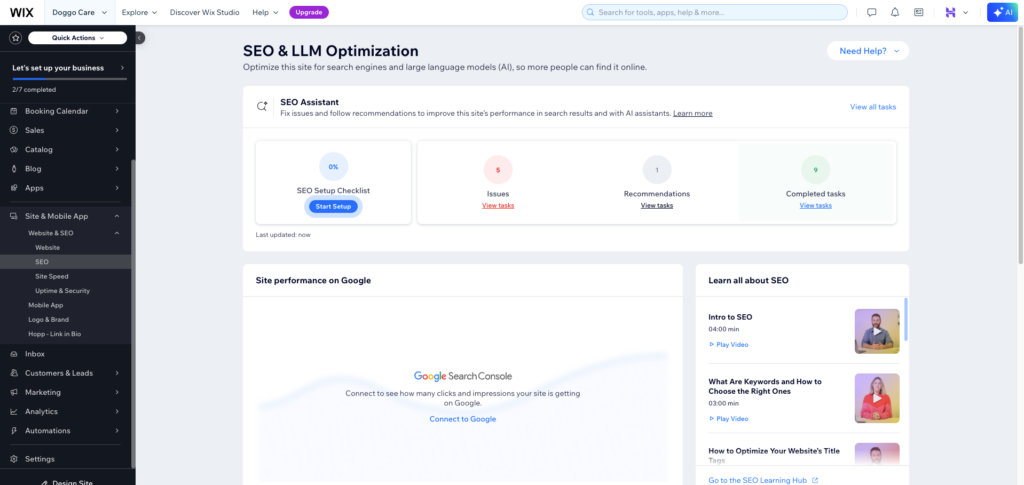
Each page’s SEO settings are customizable directly from the editor. Like WordPress, Wix lets you edit URLs, meta titles, descriptions, and add schema markup.
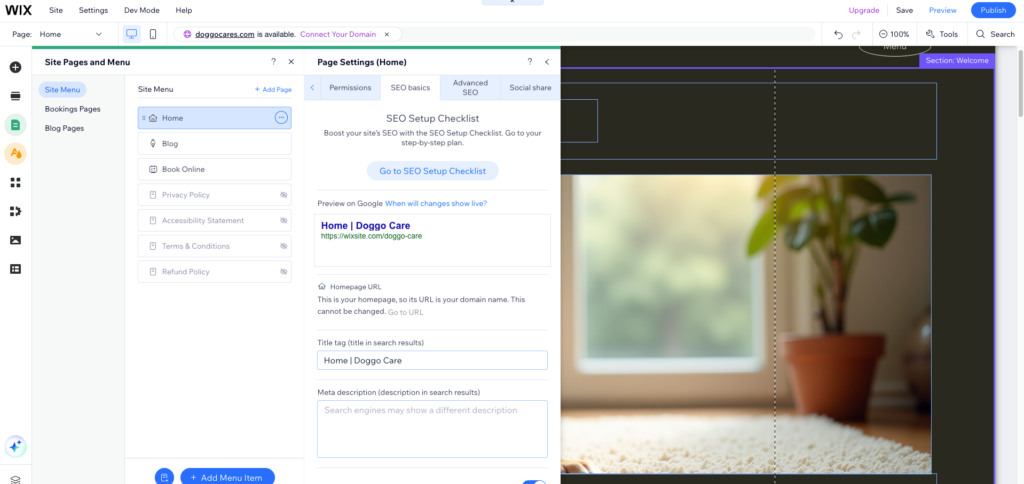
There are around 20 SEO apps in the Wix App Market. Keyword research, competitor insights, and high-quality backlinks are some of the features they offer.
Verdict
While its SEO checklist is a plus point for beginners, Wix can’t compete with WordPress’ broad and advanced SEO features.
Sure, WordPress’ SEO features take some effort to set up, especially with a plugin. However, once you get past the learning curve, you can optimize your site and drive more traffic ‒ far beyond what the built-in features can achieve.
Wix vs WordPress: Customer support
No matter how prepared you are, issues can happen to anyone. If your website goes down, you’d want quick support to get back online and avoid losing traffic and sales.
Let’s see which platform excels in this aspect.
WordPress
As a community-driven platform, WordPress has well-maintained documentation and active support forums. Tons of online tutorials in various formats and languages ‒ some even created by yours truly ‒ are easily accessible.
That said, your hosting provider will most likely handle the heavy lifting when dealing with technical issues. WordPress lacks dedicated support, so choosing the right web host is crucial.
At Hostinger, our Customer Success team is available 24/7 via live chat. Users on Business plan or higher can access Kodee, our AI assistant, from the WordPress admin dashboard. It can give advice on managing your website and navigating the platform.
Plugins and themes also have their own support depending on the developers and subscription. Premium versions usually offer priority support as part of their services.
Wix
Wix support is accessible in multiple formats across all plans.
For basic questions and issues, you can try to talk to the AI Chatbot in the Help menu first. Alternatively, reach out to a Wix Help account across major social media platforms like X and Instagram.
Wix Help Center has an extensive collection of tutorials. It also hosts the SEO Learning Hub, where you can find courses and podcast episodes about website and content optimization.
If you still need help, request a chat with a Wix Customer Care expert through the chatbot. This feature is available 24/7.
Phone support is available upon request, but 24/7 service is only in English. Check the callback operating hours for other languages. Keep in mind there may be a charge depending on your phone provider.
Verdict
Even though WordPress users can get assistance from various channels, it lacks a centralized support system. With Wix, all technical issues can be resolved through one channel, making it the winner of this round.
Wix vs WordPress for blogging
Most website-building platforms offer blogging features, but each comes with its own strengths and weaknesses.
Here’s a comparison of WordPress and Wix to help you choose the best platform for the job.
WordPress
WordPress was originally created for blogging, so it makes sense that the platform offers extensive features for this purpose.
After creating a post, WordPress lets you modify the layout with the Gutenberg block editor. You can adjust each block element or use patterns ‒ a group of blocks ‒ to save time.
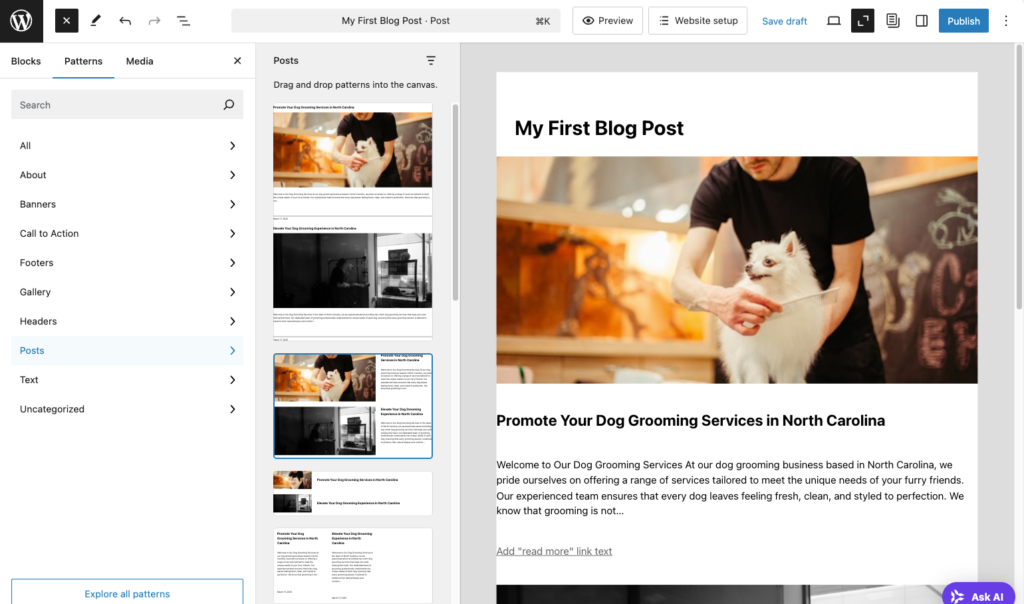
Hostinger users have AI Content Creator to simplify content creation. If you want to publish your own writing, this tool is also great for brainstorming ideas.
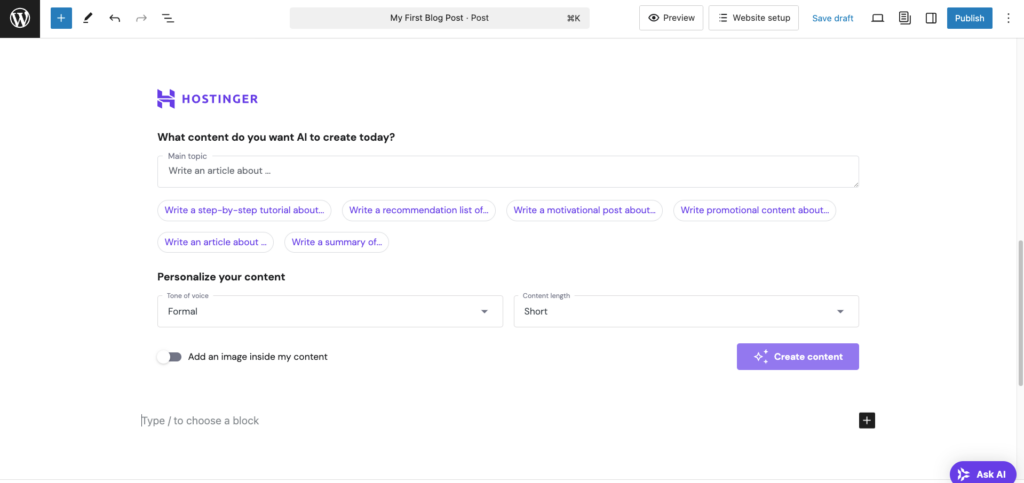
What makes WordPress shine is its taxonomies. This feature lets you group posts using tags, categories, or your own naming system to improve navigation and SEO ‒ perfect for content-heavy websites.
Manage tags and categories from your dashboard or use a plugin for custom taxonomies. You can tag and categorize posts directly in the editor.
Once you’re happy with what you’ve written, publish the post immediately or schedule it for later. Alternatively, set the post to private, password-protected, or pin it to the top of your blog.
Wix
If you request a blog during setup, Wix will automatically add a page with blogging features and AI-generated posts. Otherwise, add the Wix Blog element manually in the editor.
Changing your blog’s look is super easy with pre-built layouts and display settings. You can even choose what to show on the blog menu just by selecting the options ‒ much more straightforward than WordPress.
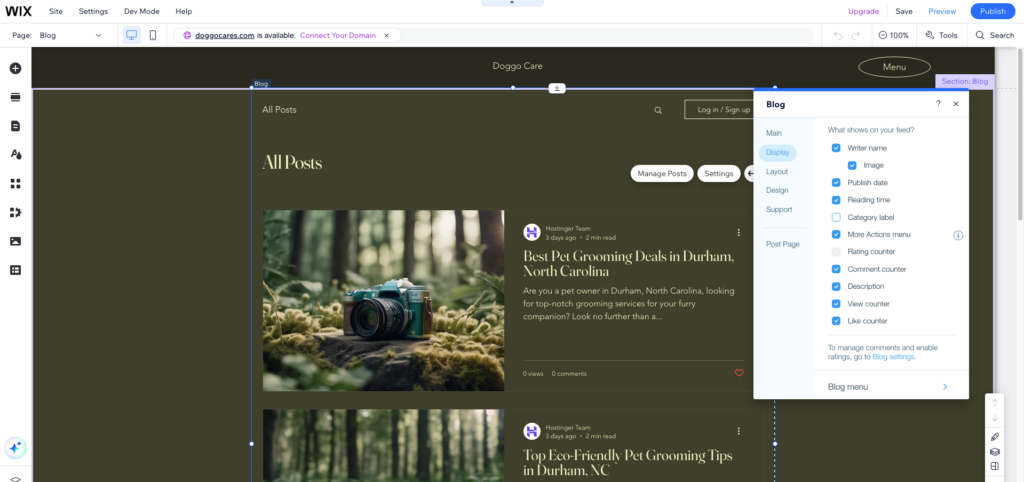
Like Hostinger, Wix offers AI tools to help you create a unique blog post from scratch. Once installed, monetization and translation functions are available in the text editor.
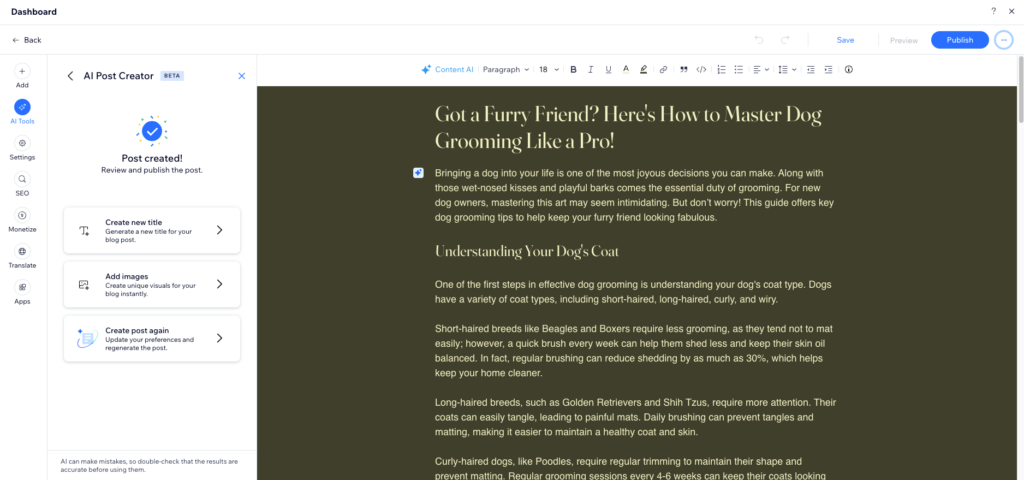
Unfortunately, formatting options are limited. Wix also doesn’t support custom taxonomies, only providing basic tags and categories.
As someone who likes to revisit their work, the history feature helps me track changes and restore previous versions if needed. You can add notes for yourself or feedback for other collaborators in the post.
Once you’re done writing, you can publish it right away or save it as a draft. There’s currently no option to publish a post privately.
Verdict
WordPress and Wix are both great options for starting a blog, but WordPress stands out with its advanced features. Custom formatting and taxonomies give you more control over your blog’s look and organization.
Plus, with its extensive SEO capabilities, it’s easier to appeal to both readers and search engines.
Wix vs WordPress for ecommerce
Just like blogging, certain platforms might fit your business needs better than others.
Let’s compare the ecommerce features of WordPress and Wix to see how well they can get your online business up and running.
WordPress
WordPress doesn’t come with built-in ecommerce features, but you can easily add them using plugins. For many aspiring business owners, WooCommerce is the top choice for creating an online store.
Whether you want to sell physical or digital products, WooCommerce can help you set up product pages, handle payments, and manage inventory.
The best part? WooCommerce is free. When you need additional features, simply scale with WooCommerce extensions or integrate it with compatible plugins.
Setting up a WooCommerce store is even easier with Hostinger. Our onboarding process helps you install WooCommerce, choose a store template, and create unique content. A checklist ensures your store is ready to launch.
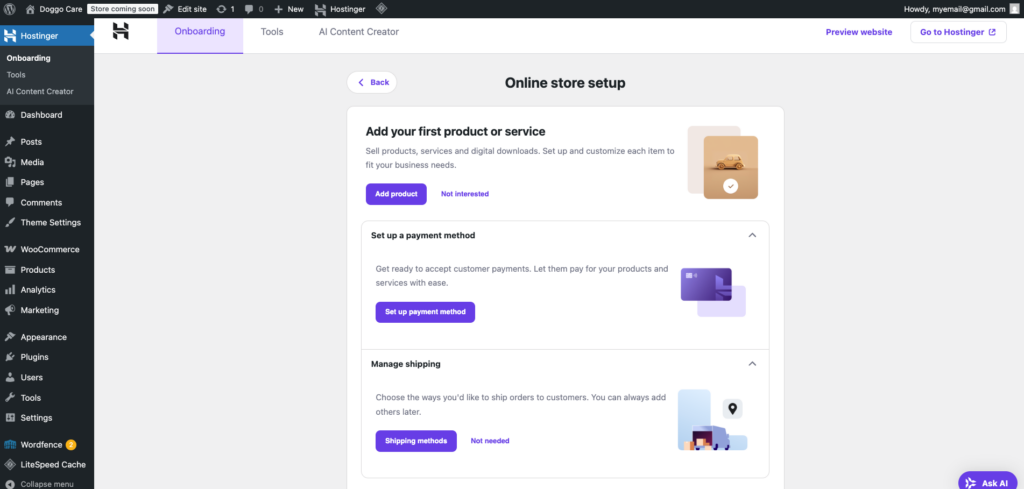
When adding products, you can be as specific as you like. Schedule sales, set stock status, add shipping dimensions, create attributes, or include other details on your product pages. Hostinger’s AI is ready to help you write unique product descriptions.
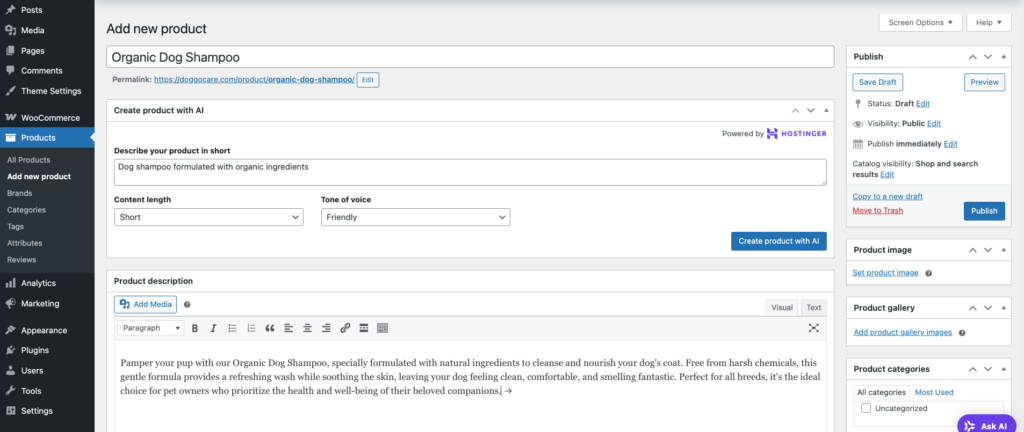
WooCommerce offers a built-in payment gateway and integrates with platforms like Stripe and PayPal through extensions. Set tax settings to include taxes in prices or automate calculations at checkout based on shipping.
The plugin also lets you set up shipping zones, track buyer activity, and monitor key store metrics. Check out our WooCommerce guide to explore its features and customization options.

Wix
Wix users can add ecommerce features with Wix Stores, but only Core plan users and above can accept payments and orders.
Once installed, the app automatically sets up product and category pages with filters. Decide what to show on the page ‒ header, breadcrumbs for navigation, or digital download badges, for example.
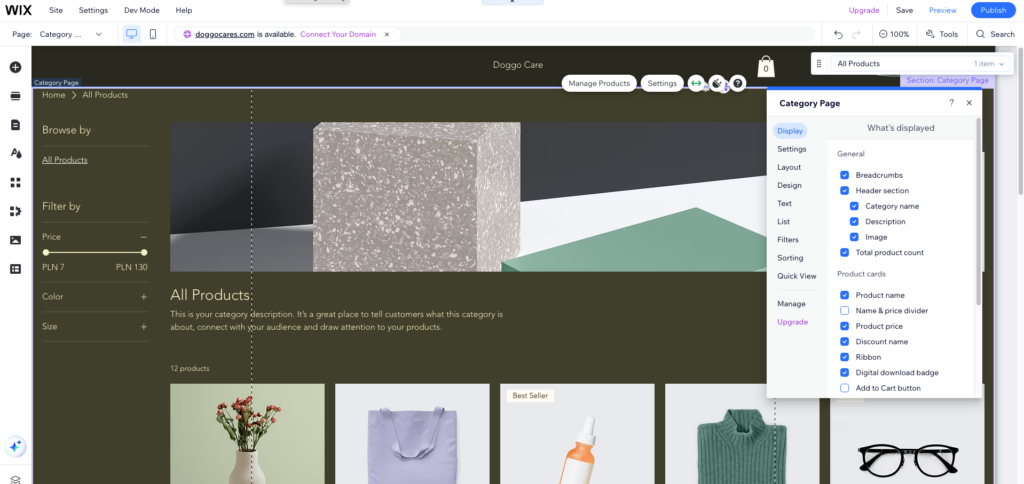
The interface for adding a new physical or digital product is straightforward, including shortcuts for SEO and marketing. The product description is AI-powered, with custom fields for additional details.
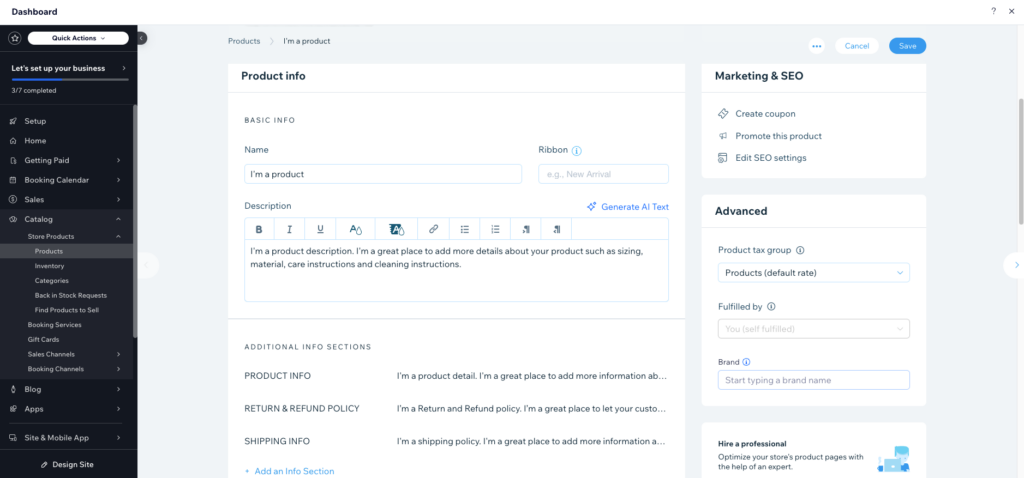
Like WooCommerce, Wix offers basic shipping, tax calculation, and inventory management functionality. It also offers around 160 apps to help scale your business.
Verdict
Creating an online store with Wix is easy, but its ecommerce capabilities are only available with pricier mid-tier plans. With Hostinger simplifying WooCommerce setup, you can get the same features (or even more, I’d argue) for a fraction of the price.
Conclusion
Now that we’ve seen what Wix and WordPress can do, here’s my answer to the big question: “Which is better: WordPress or Wix?”
It depends.
If I need a quick one-page site or simple functionality, Wix works better than WordPress. My main concern with Wix is the high starting price, but I guess that’s the cost of its beginner-friendly setup.
With WordPress, it takes time to overcome the learning curve. However, having full control over my website, including backend access, lets me shape and scale it however I like.
Hostinger and Wix both come with a money-back guarantee, so why not try them and see which fits you best?
Wix vs WordPress FAQ
Is WordPress better than Wix?
It depends on your needs. If you look for scalability and customizability, WordPress is better than Wix. On the other hand, Wix is a better choice for those valuing ease of use.
Should I switch from Wix to WordPress?
If you’ve outgrown Wix plans, switch to WordPress. With WordPress, you can choose web hosting that meets your needs and scale the website’s functionality with different plugins. The same goes for its look and feel, with thousands of themes available at different prices and including various features.
Does Wix own your content?
No, you own all the rights to anything created in your Wix account. However, keep in mind that if you violate Wix’s terms and conditions, the platform has the right to take your website down. Another consideration is that Wix doesn’t offer direct website migration, meaning you’ll need to manually export your content if you decide to switch platforms.



Comments
August 01 2024
Considering the time and effort it takes to transfer a website, as well as the potential impact on search engine rankings, is it really worth it to switch from Wix to WordPress?
August 07 2024
Hello! Moving from Wix to WordPress can be a smart move if you’re seeking more control over your website’s design and functionality. While it does take time and may temporarily impact SEO, many find the long-term advantages of WordPress—like better SEO tools and more customization—make the switch worthwhile ;)